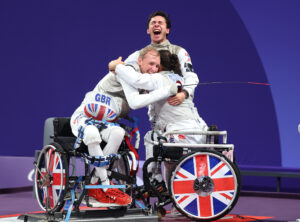Wheelchair Fencing: Collecting Objective Data
The Paralympic Games were hugely successful for the British Wheelchair Fencing team, who won two individual golds, two individual silvers, one team silver and one team bronze at Paris 2024.
The UK Sports Institute [UKSI] worked closely with Wheelchair Fencing in the lead-up to the Paralympic Games by supporting them to collect more objective data.
Objective data is factual information gathered through measurement or observation. It helps increase knowledge and supports athletes with specific data-informed decisions, which are bespoke to them, instead of following a generalised approach.
Driven by Cat Shin, Biomechanics Consultant and Project Lead at the UKSI, and Anna Knowles, Biomechanist and Performance Analyst at the UKSI, the project has helped ensure relevant data is collected to impact performance.
The data is collected through video analysis, tagging templates, and biomechanical technique analysis to track how certain movements are created.
Oliver Lam-Watson, four-time Paralympic Medallist, said: “It has been helpful having Cat and Anna work with us. They have helped us test the best way to move in the chair, to be dynamic, where to hold onto the bar, where to strap yourself to the wheelchair, and what is the best for you given your disability.
“They have helped make it [collecting more objective data] specific and relevant to me.”
Dimitri Coutya, eight-time Paralympic Medallist, said: “Collecting objective data has given me more specific targets in training, and it has helped me understand my end goal better.
“Knowing what it takes to be competitive and ensuring my training matches those needs has been the biggest gain for me.”
Piers Gilliver, eight-time Paralympic Medallist, added: “Collecting more objective data has been so important. It has also given us a big step forward compared to other teams.”

The project has impacted the wider Wheelchair Fencing support team, who use the data to adapt and inform what they do with the athletes.
Rich Collins, Performance Support Lead and Sport Psychologist for Wheelchair Fencing, reflected on this: “It is about performance intelligence – the idea that we know what we are doing when performing, rather than thinking we are performing.
“We are more intelligent about the requirements to win a medal, and all of our sports science team can support our many goals towards those outcomes.”
Learn more about how the UK Sports Institute supports Paralympic sport by accessing the UKSI Insider podcast.